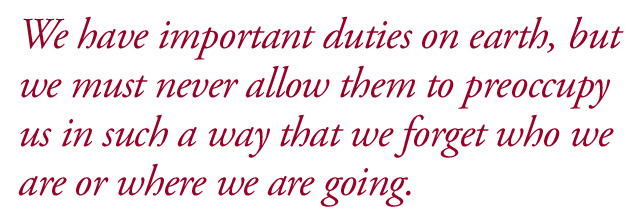Back to series


Loving God with Heart and Mind
Click here to open a Print- Friendly PDF
I recall a conversation some years ago with Donald Coggan, formerly archbishop of Canterbury. We were discussing some of the challenges to theological education, and had ended by sharing our concerns over folk who left theological education knowing more about God, but seemingly caring less for God. Coggan turned to me, sadly, and remarked: ‘The journey from head to heart is one of the longest and most difficult that we know.’ I have often reflected on that comment, which I suspect reflects his lifelong interest in theological education and the considerable frustrations it generated—not to mention his experiences of burnt-out clergy, who seemed to have exhausted their often slender resources of spiritual energy, and ended up becoming a burden instead of a gift to the people of God.
I have no hesitation in affirming that theology is of central importance to Christian life and thought. I have little time for the various efforts to dumb down the preaching and teaching of our churches, or simply to focus on the development of new and better techniques for the care of souls and the growth of the churches. But I am an honest person, and I want to admit from the outset that focusing simply on doctrinal affirmations is seriously deficient. Theological correctness alone is no balm for the wounds of our frail and sinful humanity. We cannot nourish the mind while neglecting the heart. Like its political counterpart, an obsession with theological correctness can simply engender the kind of harsh judgmental personality which is eager to seek out and expose alleged doctrinal errors, and cares little for the fostering of Christimaging relationships.

In my first period as a Christian, I found my attention focusing on understanding my faith. I continue to regard this as being of the utmost importance. There is a marvelous coherence to Christian doctrine, and wrestling with the great truths of our faith provided me with both spiritual encouragement and intellectual challenge. Yet it seemed to me that my “knowledge” of the Christian faith was rather dry and cerebral.
Part of the difficulty was that I was, like most people of my generation, deeply influenced by the Enlightenment. Christianity was all about ideas—and it was important to get those ideas right. As a result, theological correctness had become something of an obsession with me. I had failed to realize that the gospel affects every level of our existence—not just the way we think, but the way in which we feel and live. The Enlightenment had championed the role of reason, and vetoed any engagement with emotions or imagination. Yet I knew that writers such as Jonathan Edwards and C.S. Lewis had stressed the importance of precisely these aspects of our lives. I gradually came to the realization that my faith was far too academic.1
My realization of the importance of spirituality began about 1989, but really blossomed from about 1992. I was invited to lead a regular summer school course in Oxford on “medieval and Reformation spirituality.” This allowed me to engage with some of the great texts of Christian spirituality, including many from the period of the Reformation. As my students and I wrestled with these texts, we found ourselves challenged to deepen the quality of our Christian faith through being more open to God. I found that the quality of my Christian life deepened considerably as a result.
As I mentioned earlier, my basic understanding of Christian doctrine has not changed over the last ten years. I remain deeply committed to the fundamentals of Christian orthodoxy. What has happened is that these ideas have taken on a new depth, both as I appreciated more their implications, and as I realized that my grasp of the totality of the Christian gospel had been shallow. Perhaps I could say that I experienced a deepening in the quality of my faith, rather than any change in what I believed.
Traditional theology makes a distinction between two senses of the word “faith”. On the one hand, there is the “faith which believes”—that is, the personal quality of trust and commitment in God. On the other, there is the “faith which is believed”—that is, the body of Christian doctrine. Using this way of speaking, I could say that, in my case, the “faith which is believed” remained unaltered. What developed, matured and deepened was the “faith which believes”. The New Testament often compares the Kingdom of God to a growing plant, or a seed taking root. What happened to me was that a plant which had grown to some extent underwent a new spurt of growth, leading to increased strength and vitality.
My guess is that many readers of this article will be able to identify with my earlier and rather academic approach to faith, and are fed up being told by their doubtless well-meaning friends that they just need to know more facts about their faith. My experience is that we need to go deeper, rather than just know more. Perhaps we all have to discover that we have simply scratched the surface of the immense riches of the gospel. Beneath the surface lies so much more, which we are meant to discover and enjoy. The greater our appreciation of the wonder, excitement, and sheer delight of the Christian faith, the more effective our witness to our friends, and the greater our enjoyment of the Christian faith.
Spirituality is all about the way in which we encounter and experience God, and the transformation of our consciousness and our lives as a result of that encounter and experience. It is most emphatically not the exclusive preserve of some spiritual elite, preoccupied with unhealthy perfectionist tendencies. It is the common duty and joy of all Christian believers, as they long to enter into the deeper fellowship with the living God which is promised in the Scriptures. We can think of it in terms of the internalization of our faith. It means allowing our faith to saturate every aspect of our lives, infecting and affecting our thinking, feeling, and living. Nobody can doubt how much we need to deepen the quality of our Christian lives and experience, with God’s gracious assistance, and live more authentic lives in which we experience to the full the wonder of the love and grace of God. It is about ways in which we can foster and sustain our personal relationship with Christ. Christian spirituality may be thus understood as the way in which Christian individuals or groups aim to deepen their experience of God, or to “practise the presence of God,” to use a phrase especially associated with Brother Lawrence (c. 1614-91).2
Any definition of “spirituality” is likely to make reference to the following themes:
• knowing God, not just knowing about God;
• experiencing God to the full;
• transformation of existence on the basis of the Christian faith;
• attaining Christian authenticity in life and thought.
Spirituality aims to ensure that we both know about God and know God. It seeks to apply God to our hearts as well as our minds. It deals with the deepening of our personal knowledge of God. Yet this immediately indicates that spirituality is grounded in good theology. Spirituality is about the personal appropriation of what theology points toward and promises. Theology thus provides us with a secure foundation for Christian living.
For the first period of my Christian life, I thought that Christian development was all about thinking harder about things I already knew. It brought some useful results. For example, I realized how important it was to explain key Christian ideas faithfully and effectively, and developed several ways of doing this which have proved very helpful to others. But it soon became obvious that this had its limits. I stalled. It was as if my faith was affecting only a tiny part of my life.
It was then that I began to realize the importance of letting biblical ideas impact on my imagination and experience. I read some words of a medieval writer, Geert Zerbolt van Zutphen (1367-1400), who stressed the importance of meditating on Scripture. Not understanding, but meditating. Here is what he had to say.
Meditation is the process in which you diligently turn over in your heart whatever you have read or heard, earnestly reflecting upon it and thus enkindling your affections in some particular manner, or enlightening your understanding.
Words like these brought new light and life to my reading of the Bible. I had thought that meditation was some kind of Buddhist practice that was off-limits for Christians. Yet I had failed to notice how often Old Testament writers spoke of meditating on God’s law. Meditation was about letting the biblical text impact upon me, “enkindling the emotions” – what a wonderful phrase! – and “enlightening the understanding”. And my heart, as well as my mind, was to be involved! The worlds of understanding and emotion were brought together, opening the door to a far more authentic and satisfying way of living out the Christian life.

So how do we ensure that the riches of Christian theology nourish our hearts, as well as our minds? Let’s look at just one way in which we can do this. Theology affects the way in which we live. An excellent example is provided by the Christian vision of the New Jerusalem, which is meant to encourage us to lift our eyes upwards, and focus them on where Christ has gone before us. Paul makes this point as follows in his letter to the Colossians:
“Since, then, you have been raised with Christ, set your hearts on things above, where Christ is seated at the right hand of God. Set your minds on things above, not on earthly things. For you died, and your life is now hidden with Christ in God” (Colossians 3:1-3).
Our belief concerning the New Jerusalem ought to encourage us to behave as people who are looking forward to finally being with Christ, and to view the world accordingly.
In a series of addresses given to the InterVarsity Mission Convention at Urbana, Illinois, in 1976, John Stott developed the importance of the hope of glory for theology, spirituality, and especially evangelism. His addresses issued a clarion call for the recovery of this leading theme of the Christian faith, and its application to every aspect of our present Christian lives.
Lift up your eyes! You are certainly a creature of time, but you are also a child of eternity. You are a citizen of heaven, and an alien and exile on earth, a pilgrim travelling to the celestial city.
I read some years ago of a young man who found a five-dollar bill on the street and who “from that time on never lifted his eyes when walking. In the course of years he accumulated 29,516 buttons, 54,172 pins, 12 cents, a bent back and a miserly disposition.” But think what he lost. He couldn’t see the radiance of the sunlight, the sheen of the stars, the smile on the face of his friends, or the blossoms of springtime, for his eyes were in the gutter. There are too many Christians like that. We have important duties on earth, but we must never allow them to preoccupy us in such a way that we forget who we are or where we are going.
Stott encourages us to renew our acquaintance with the glory that awaits us, and begin to anticipate its wonder—and allow that to impact upon us now. My concern in this brief paper has been to offer some preliminary reflections on the importance of relating our minds and hearts, and some thoughts on how we might go about doing this. Happily, others have developed such insights in much greater detail! Theology offers us a firm foundation upon which we may build, ensuring that the great riches and truths of the gospel stimulate and nourish our minds, emotions, and imaginations. Yet we cannot abandon the building once the foundation has been laid; the superstructure must be erected, and inhabited. Paul wrote these words: “I consider everything a loss compared to the surpassing greatness of knowing Christ Jesus my Lord” (Philippians 3:8). I pray that we may know the full reality of that “surpassing greatness”, and that it may inspire us and encourage us as we journey on the road to the New Jerusalem.

Alister McGrath
Professor
Alister McGrath serves as Senior Research Fellow at the Ian Ramsey Centre for Science and Religion at Oxford. He has also served as the Senior Research Fellow at Harris Manchester College in Oxford, the President of the Oxford Centre for Christian Apologetics and associate priest in Cotswolds for a group of village parishes (Church of England.) McGrath’s best known books include The Twilight of Atheism, The Dawkins Delusion?, Dawkins’ God: Genes, Memes, and the Meaning of Life, A Scientific Theology and his most recent, Coming to Faith Through Dawkins: 12 Essays on the Pathway from New Atheism to Christianity, co-authored with Denis Alexander. He received his MA and DPhil from Oxford University.

 COPYRIGHT: This publication is published by C.S. Lewis Institute; 8001 Braddock Road, Suite 301; Springfield, VA 22151. Portions of the publication may be reproduced for noncommercial, local church or ministry use without prior permission. Electronic copies of the PDF files may be duplicated and transmitted via e-mail for personal and church use. Articles may not be modified without prior written permission of the Institute. For questions, contact the Institute: 703.914.5602 or email us.
COPYRIGHT: This publication is published by C.S. Lewis Institute; 8001 Braddock Road, Suite 301; Springfield, VA 22151. Portions of the publication may be reproduced for noncommercial, local church or ministry use without prior permission. Electronic copies of the PDF files may be duplicated and transmitted via e-mail for personal and church use. Articles may not be modified without prior written permission of the Institute. For questions, contact the Institute: 703.914.5602 or email us.
-
Recent Podcasts
Ralph Waldo Emerson’s Philosophy and Influence
by David George Moore on July 26, 2024Ralph Waldo Emerson was a gifted nineteenth century...Read More
-
The Side B Stories – Nate Sala’s Story
by Jana Harmon, Nate Sala on July 19, 2024
-
Terrorism Through the Eyes of Faith
by Dennis Hollinger on July 12, 2024
-
Recent Publications
Hasn’t Science Proven That Belief in God Is an Outdated Superstition?
by Sharon Dirckx on July 1, 2024Many assume that scientific practice and belief in...Read More
-
Has the Bible Been Corrupted as Some Muslims Claim?
by Andy Bannister on June 1, 2024
-
Seeing Jesus Through the Eyes of Women
by Rebecca McLaughlin on May 15, 2024
0
All Booked
0.00
All Booked
0.00
All Booked
22194
C.S. Lewis’s The Abolition of Man Live Online Small Group 8:00 PM ET
https://www.cslewisinstitute.org/?event=c-s-lewiss-the-abolition-of-man-study-course&event_date=2024-10-02®=1
https://www.paypal.com/cgi-bin/webscr
2024-10-02

Next coming event
Days
Hours
Minutes
Seconds
C.S. Lewis’s The Abolition of Man Live Online Small Group 8:00 PM ET
On October 2, 2024 at 8:00 pmCategories
Speakers

Alister McGrath
Professor
Team Members

Alister McGrath
Professor
Alister McGrath serves as Senior Research Fellow at the Ian Ramsey Centre for Science and Religion at Oxford. He has also served as the Senior Research Fellow at Harris Manchester College in Oxford, the President of the Oxford Centre for Christian Apologetics and associate priest in Cotswolds for a group of village parishes (Church of England.) McGrath’s best known books include The Twilight of Atheism, The Dawkins Delusion?, Dawkins’ God: Genes, Memes, and the Meaning of Life, A Scientific Theology and his most recent, Coming to Faith Through Dawkins: 12 Essays on the Pathway from New Atheism to Christianity, co-authored with Denis Alexander. He received his MA and DPhil from Oxford University.





